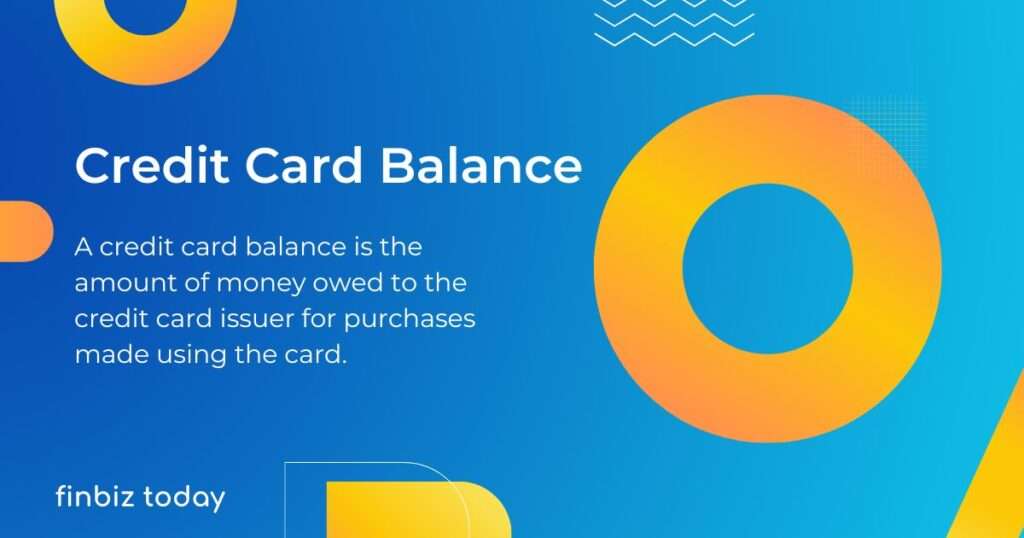Navigating the realm of credit cards involves mastering various concepts, among which understanding your credit card balance is paramount. In this comprehensive guide, we delve into the intricacies of credit card balance, shedding light on its definition, importance, and practical implications. From deciphering statements to discerning between credit card balance and available credit, we equip you with the knowledge needed to effectively manage your credit card account and make informed financial decisions. Join us as we unravel the mysteries surrounding credit card balance and empower you to take control of your financial journey.

What is a Credit Card Balance?
A credit card balance refers to the total amount of money owed to the credit card issuer by the cardholder. It includes outstanding purchases, cash advances, balance transfers, and any applicable fees or interest charges. Understanding your credit card balance is essential for managing your finances effectively and avoiding debt accumulation.
How can I Check my Credit Card Balance?
Checking your credit card balance is simple and can be done through various methods:
Online Banking: Most credit card issuers offer online banking services that allow cardholders to view their account balances, transaction history, and payment due dates through their website or mobile app.
Mobile Apps: Many credit card issuers also provide dedicated mobile apps that enable users to access their account information conveniently from their smartphones or tablets.
Customer Service: Cardholders can contact their credit card issuer’s customer service department via phone or email to inquire about their current balance and recent transactions.
Monthly Statements: Credit card issuers send monthly statements to cardholders detailing their account activity, current balance, minimum payment due, and other relevant information.
What does my Credit Card Balance Mean?
Your credit card balance reflects the total amount of money you owe to the credit card issuer, including any unpaid charges, fees, and accrued interest. It is important to pay attention to your credit card balance and make timely payments to avoid accumulating debt and incurring additional interest charges.
Examples of Credit Card Balance
Examples of credit card balances include:
Outstanding Purchases: Charges made on the credit card for goods and services that have not yet been paid off.
Cash Advances: Withdrawals made from the credit card account in the form of cash, typically subject to higher interest rates and fees.
Balance Transfers: Transfers of outstanding balances from one credit card to another, often used to consolidate debt or take advantage of promotional interest rates.
Basics of Credit Card Balance
The basics of credit card balance include understanding:
Total Balance: The sum of all charges, fees, and interest accrued on the credit card account.
Minimum Payment: The minimum amount that must be paid by the due date to avoid late fees and penalties.
Statement Closing Date: The date on which the credit card issuer prepares the monthly statement, detailing the account activity for the billing cycle.
Understanding your Credit Card Balance
To manage your credit card balance effectively, it is essential to:
Monitor Your Spending: Keep track of your purchases and expenses to avoid overspending and accumulating debt.
Make Timely Payments: Pay your credit card bill in full and on time each month to avoid late fees, interest charges, and negative impacts on your credit score.
Consider Balance Transfers: If you have high-interest credit card debt, consider transferring the balance to a card with a lower interest rate or taking advantage of promotional balance transfer offers to save on interest costs.
Definition of Credit Card Balance
A credit card balance is the total amount of money owed to the credit card issuer by the cardholder, including outstanding charges, fees, and interest.
Credit Card Balance Refund
A credit card balance refund occurs when a cardholder returns a purchased item or receives a credit for an overpayment, resulting in a reduction of the outstanding balance on the credit card account.
Negative Credit Card Balance
A negative credit card balance occurs when the amount of credit issued to the cardholder exceeds the total amount owed, often resulting from refunds, credits, or overpayments.
Positive Credit Card Balance
A positive credit card balance occurs when the cardholder owes money to the credit card issuer, typically as a result of outstanding charges, fees, or interest.
Credit Card Balance Transfer Rate
A credit card balance transfer rate refers to the interest rate charged on balances transferred from one credit card to another, often offered at promotional rates for a limited period.
Credit Card Balance Statement
A credit card balance statement is a monthly statement provided by the credit card issuer to the cardholder, detailing the account activity, current balance, minimum payment due, and other relevant information for the billing cycle.
Can I Check Available Credit Card Balance Online?
Yes, most credit card issuers offer online banking services that allow cardholders to check their available credit card balance, along with other account details, through their website or mobile app.
Difference Between Credit Card Balance and Available Credit
The credit card balance represents the total amount owed to the credit card issuer, including outstanding charges, fees, and interest, whereas available credit refers to the amount of credit remaining on the card that can be used for additional purchases or cash advances. Understanding the difference between the two is crucial for managing your credit card account responsibly and avoiding overspending.
Conclusion
In conclusion, credit card balance is a fundamental aspect of managing your finances and understanding your credit card account. By understanding the concepts discussed in this guide, such as checking your balance, interpreting statements, and distinguishing between credit card balance and available credit, you can skillfully manage your credit card account and make well-informed financial choices. Whether you’re a seasoned cardholder or new to credit, mastering the fundamentals of credit card balance is essential for achieving financial stability and building a solid credit history.

